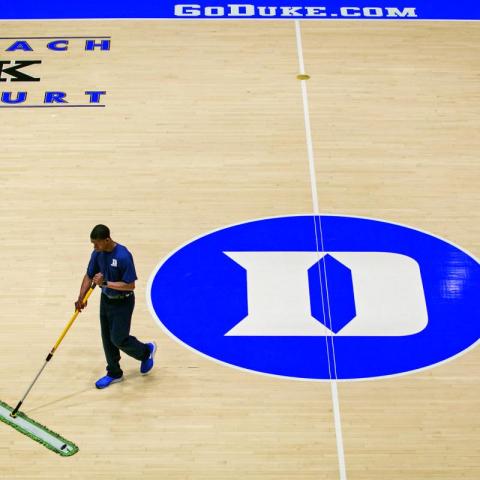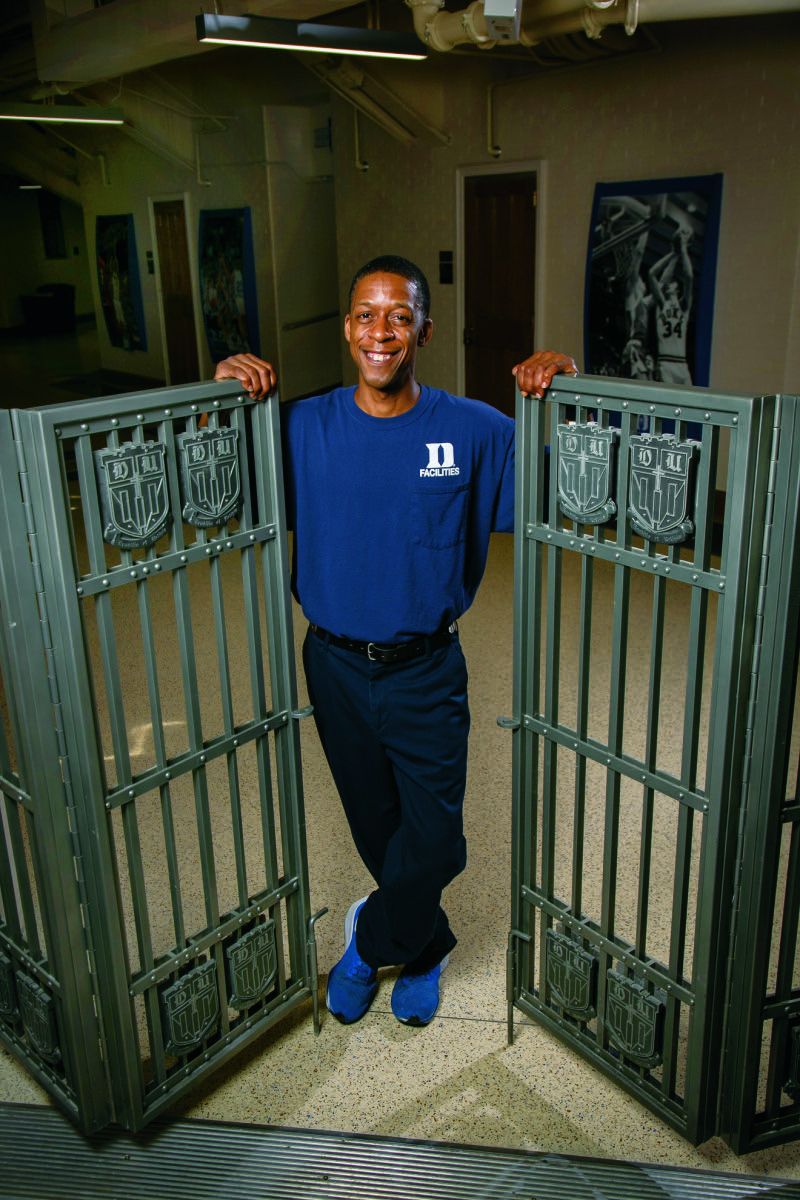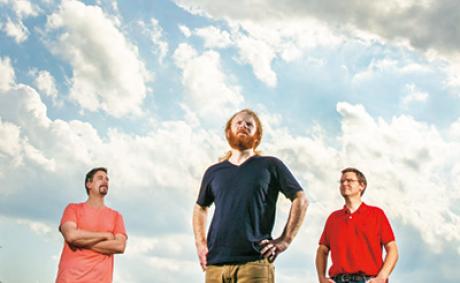It’s game day in Durham, North Carolina, and William Harris Jr. is hard at work. The 49-year-old swiftly steers a 50-inch dry mop with one hand across a college gymnasium floor, while the other hand subtly taps the air to the beat of the ’90s hip-hop tunes on his headphones.
The loose-fitting navy scrubs he wears dwarf his slight frame, but as he guides the mop across the floor with both hands, the bulging muscles and veins in his bare forearms reveal the truth — Harris stays in top shape. Periodically, he pauses to evaluate his work by scuffing his Duke blue Nike sneaker on the court — eek! skaa-week! He nods with approval at the sound.
He works the mop like a paint brush, except instead of paint this artist uses “Super Squeak” — an alcohol-based cleanser the color of Mountain Dew. And instead of paper, his canvas is the self-proclaimed “crown jewel of college basketball’s classic venues.”
Harris is the main floor technician who cleans and cares for Coach K Court inside Duke’s historic 9,314-seat Cameron Indoor Stadium. He sweeps and polishes this hallowed ground before and after every Duke basketball and volleyball game, which amounts to at least four nights a week during the season. When he’s not tending Duke’s home court — the same court where basketball legend Grant Hill and player-turned-ESPN-analyst Jay Bilas '86, J.D.'92 once played — William cleans and maintains all the other floors in the building.
Usually, Harris works nights, clocking in around 10:45 p.m. and heading home as the sun rises. But from the start of basketball and volleyball season in October all the way through commencement in May, he’ll also work hundreds of overtime hours for all the games and various graduation ceremonies that take place in Cameron.
Working games is the best and easiest part of his job, Harris said, and after eight years in his role, he’s mastered the routine. Three hours or so before tip-off, he preps the court for the players. Then, he zips around court level emptying trash cans before the game starts. During the first half, he tidies and vacuums the Legacy Room — a posh suite just off the court reserved for the generous supporters of the Duke Basketball Legacy Fund. At halftime, he dashes out to sweep and Super Squeak the court for the second half.
Super Squeak leaves the court a bit tacky, which makes the athletes’ sneakers squeak (hence the name). Without that extra friction, players could slip and fall — a real worry given how fast players run, stop and change course.
“I have the best job. People think I’m lying or over-exaggerating when I tell them that — I’m not.”
Former head men’s basketball coach Mike Krzyzewski, for whom the court was named in 2000, shares Harris’ appreciation for floor cleanliness. He considered a spotless court essential for his players’ safety and knew the court was in good hands with Harris. “William’s a terrific guy who has become a very close friend to our program,” Krzyzewski said in a statement.
Sometimes Harris can’t believe that he got to work in the same building as the legendary Coach K. Whenever their paths crossed, he’d get a little starstruck.
“He called me by my name one day, and I felt like a little damn schoolgirl,” he said, grinning. “I’ve always been a Duke basketball fan, as long as I can remember.”
The first time William set foot in Cameron was with his father, William Harris Sr., who served as a director of graduates and alumni affairs in Duke’s Alumni Affairs office from 1982 to 1987. The younger Harris remembers watching Mike Gminski, who played center for Duke between 1976 and 1980. (Gminski’s jersey number now hangs in the rafters.)
While Harris says his father helped foster his love for sports, he credits his mother with showing him the value of hard work and dedication. Edna Harris worked as an administrative assistant for the Durham Police Department, first in the vice narcotics unit and then for the Chief of Police, and she impressed on Harris and his two siblings the importance of doing things right the first time.

“When I was younger, I didn’t have a work ethic,” he said. “I was terrible, lazy, all that.”
At the age of 20, Harris had his one and only run-in with Durham law enforcement. As the mid-1990s crack epidemic raged through American cities — including Durham — he wasn’t thinking much about the consequences of his actions. Dealing seemed like a quick and easy way to make extra bucks, at the time. Harris didn’t even have plans for the money. It was just the allure of making fast cash that drew him in.
In early March of 1994, Harris got caught by the police in his supplier’s apartment. The officers asked him his name, and when he answered, they took him to a back bedroom and asked, “Are you Edna Harris’s son?” Yes, he said. The cops, who were Black men, cursed him out and asked him what the hell he was doing in a drug-filled apartment. Eventually, they let him go. But first thing the next morning, they told his mother.
Later that day over lunch, Edna told her son that if the police saw him in “that part of town” again, he wouldn’t get another chance. He’d go straight to jail.
“I was young and stupid,” Harris said. “If you’re in the drug game, you know, there’s not too many retirees.”
That conversation with his mother was the wake-up call he needed to turn his life around. When she dropped him off at home, she also handed him a Navy recruiter’s phone number (both his mother and father had served overseas). He called the next day. Soon he was on his way to Naval Station Great Lakes for boot camp.
That next year, in 1995, Edna died from breast cancer. William said his mother never told him she was sick, but he believes that was a large part of why she wanted to see him turn his life around — so she could leave this life knowing her oldest son would be alright. Harris doesn’t dwell on where he might be or what he’d be doing if he’d stayed in Durham, but he knows joining the Navy kept him out of jail — and it probably saved his life.
The Navy also refined his gritty work ethic. After finishing boot camp, he enrolled in the Navy’s three-month culinary program and graduated top of his class. On his first ship though, he got to peel potatoes instead of plan elaborate meals. Top marks couldn’t replace seniority, he soon learned.
“You’ve got to spend your time doing the grunt work, and then when they know that you know what you’re doing, then your responsibilities increase,” he said. Harris wouldn’t have his current job without that lesson in persistence. For 10 years, he cleaned and cared for various buildings around campus before earning the gig in Cameron.
Bob Weiseman, who oversees all Duke’s athletics facilities and game day operations, knew he wanted a true Duke fan to be the one in charge of maintaining Coach K Court — someone who knew and valued the building’s storied legacy. Soon after Harris joined the Cameron team, Weiseman saw him using a pole with a tennis ball on its end to rub off every sneaker mark after a basketball game. He knew then that he’d picked the right person for the job.

Harris views work in simple terms: Do the job, do it well the first time so no one else has to redo it later, and then go home with a clean conscience. As a result, he doesn’t have any “work friends,” choosing instead to immerse himself in the work. Originally, Harris didn’t sign up to work many of the basketball games, instead letting other people claim the extra hours. But when he’d come into work for his usual shift, he often had to play catch-up finishing tasks that the people on overtime should’ve already completed. While those people got paid time-and-a-half for a job they didn’t finish, William just received his regular rate of $18.25 an hour to pick up their slack. Now, he’ll just as soon work five basketball games in one weekend if it means he doesn’t have to worry about cleaning up after other people.
All that work, though, means Harris has little free time during the school year.
“When there’s basketball, football, volleyball — we don’t see each other a lot on the weekends, except for here and there in between,” said Jennifer Morehead, Harris’ partner.
The two met shortly after Harris left the Navy in 2003. Fast forward 19 years and they now have two children together — 16-year-old daughter Branwen Morehead and 14-year-old son William Harris III (known as “Little William,” even by the family’s Amazon Alexa). The kids used to be upset that their father wasn’t around much during the school year, but they’ve since changed their attitudes now that they realize his paycheck buys them Christmas gifts and nice vacations.
“Now they cheer when I leave for work,” Harris jokes.
He first started working night shifts so that Morehead could go back to school. After finishing work in the early morning, he’d stay with the kids during the day while she was in class. Once she earned her GED, he pushed her to get her associate degree, then a bachelor’s, and finally a master’s in social work. Now, she works as a foster care social worker.
“He makes my life easier,” Morehead said, explaining how when Harris comes home in the mornings, he’ll sometimes prepare the main course for dinner so that all she has to do in the evening is heat it up and prepare the sides. Before he leaves for work at night, he’ll make sure the TV remotes are ready and waiting for her on the extra pillow in the center of their bed.
“That’s how you know that somebody loves you and cares for you. It’s the little things,” Morehead said.
Although he’s a Duke basketball superfan, Harris tries not to interact too much with the players and coaches, so as not to distract them. Each year on Senior Night, he might ask some of the graduating players to sign the roster card before they leave. But that’s about it. He doesn’t seek out pats on the back or accolades from the players and coaches either. When he gets them, he often feels uncomfortable.
“They have a lot of things on their plate,” Harris says of the student athletes, “and just acknowledging the work that I do, thanking me for what I do — it’s a good thing.”
He did build a rapport with one former player, walk-on Brennan Besser, who graduated in 2019. In his Senior Night speech, Besser gave Harris a shoutout.
“This is as much Will’s gym as much as it is ours — maybe even more,” the former player told the student section in his 2019 speech. He waved Harris over to join him in the middle of the court. “He works day in and day out to make sure that this place looks as beautiful and is as impressive as the legacy that it embodies.”
The Cameron Crazies let out a cheer of approval. Harris gave a bashful smile, a small wave, and then quickly hurried off the court back to his spot in the corner.




